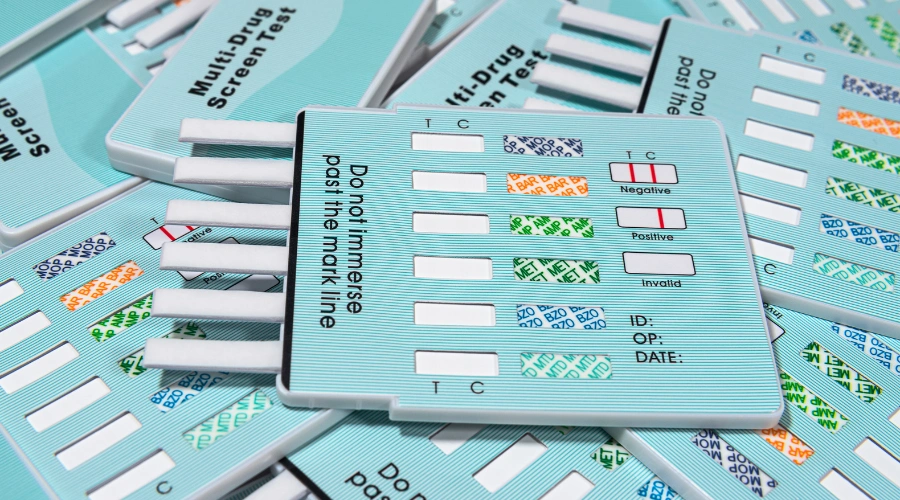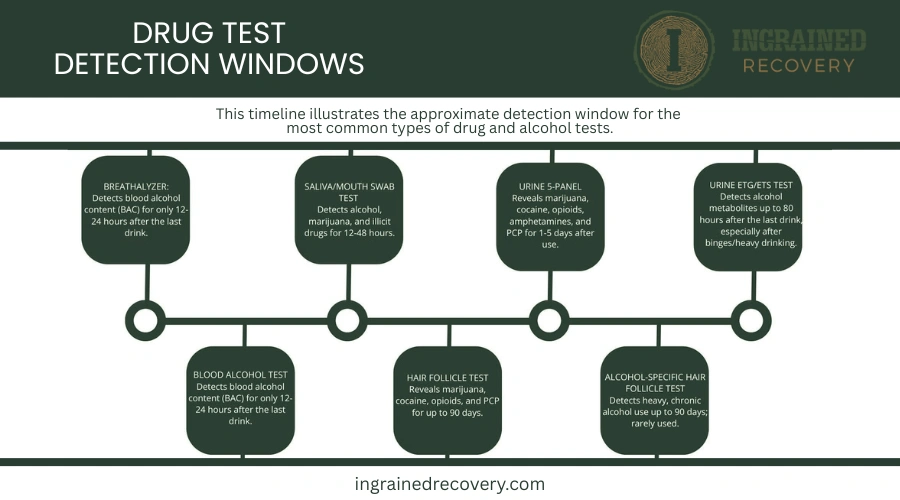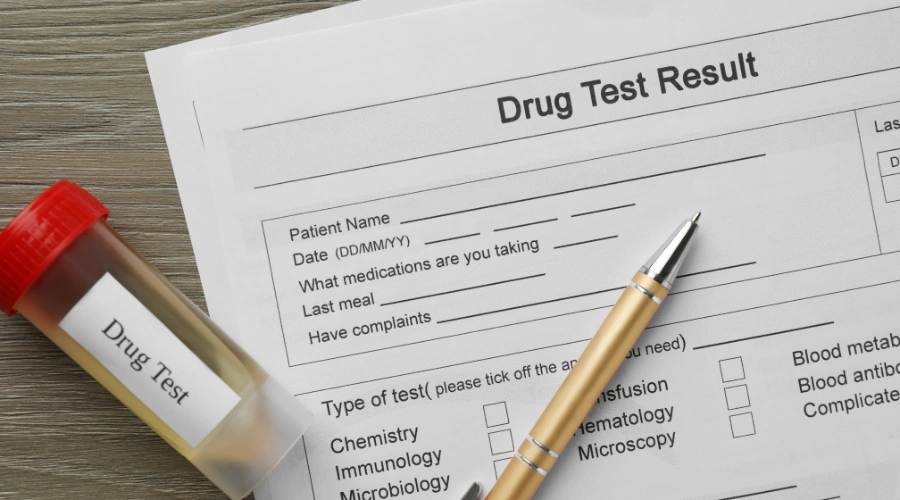Find Guidance on Whether Work Drug Tests Detect Alcohol
Does alcohol show up on a drug test for work? If you worry that a drug and alcohol test could pick up your alcohol consumption, the answer is maybe.
It primarily depends on whether your employer uses a standard 5-panel test or adds a component to detect recent alcohol consumption.
If passing a pre-employment screening or random workplace alcohol consumption test concerns you, it is a sign that you are aware that you’re struggling with alcohol or substance use. Trying to game the system never works; false-positive test results are rare.
Ingrained Recovery offers you a chance at recovery in our treatment center in the Peach State, staffed with qualified, compassionate healthcare providers.
This post will help you understand which workplace alcohol and drug tests can detect alcohol consumption and offer steps you can take to change your alcohol consumption patterns.
Get Proven Alcohol Detox and Rehab Options
Find Help At Ingrained Recovery
Why Employers Conduct Drug and Alcohol Tests
Most employers conduct alcohol and drug tests to ensure workplace safety and limit their liability. Testing for recent alcohol use (or other substances) helps ensure accident prevention and injuries.
In some sectors, such as transportation, federal and state laws mean legal obligations that employers must comply with.
The Main Types of Alcohol and Drug Tests Employers Use

Employers can use various tests, including the following:
- Standard 5-panel urine sample tests: These urine tests deliver highly accurate results for commonly abused drugs, but not for alcohol consumption. Employers must specifically request urine alcohol tests in addition to 5-panel test results.
- Breathalyzer tests: Breath tests are best specifically for determining recent alcohol use. It can detect recent alcohol use with a high degree of accuracy. Results are almost instant. DOT and government employees in safety-sensitive positions are the most likely to encounter this test at work.
- Saliva/mouth swab tests: Saliva testing covers alcohol consumption as well as marijuana, opioids, and other drugs.
- Blood tests: Highly accurate, blood tests can determine if drugs or alcohol are present in the bloodstream. They are rare in the workplace, but they’re an option after serious workplace accidents.
- Hair tests: Hair follicle testing finds drug or alcohol metabolites attached to the hair strands.
Five-panel urine tests are the most common choice of employers. But while these urine tests don’t automatically detect alcohol consumption, additional testing can detect alcohol metabolites.
Breaking Down Standard Drug Tests
As mentioned before, the most common urine alcohol test is the 5-panel drug test. These are the drugs these urine tests are looking for:
- Marijuana (THC): While medical marijuana may be legal in Georgia, many employers prohibit any impairing substance use on the job, including marijuana, kratom, or alcohol use.
- Cocaine: Standard urine tests also detect crack cocaine
- Amphetamines and methamphetamines
- Opiates, including morphine, heroin, codeine, and prescription medications
- Phenyclidine (PCP)
The 5-panel urine test does an excellent job of detecting certain drugs with rare false-positive results. They are considered highly accurate and are respected by most courts in traffic accident and employment-related cases.
Alcohol Detection and Testing Procedures

Alcohol use testing methods and procedures can vary based on the type of test and individual factors. The factors that can make a difference include the individual’s:
- Weight
- Age
- Liver function
- Gender
- Genetic variations
- Taking certain medications
- Binge or heavy drinking that accumulates versus light consumption patterns
- Overall health condition
Testing labs ensure fairness and accuracy by following standardized guidelines to avoid any discrimination-based determinations. Random workplace and pre-employment screenings must also apply diligent standards to all individuals. That ensures privacy and legal rights while ensuring safety law compliance.
Understanding Drug and Alcohol Detection Windows

How long is alcohol detectable? This is a different question from how long it takes to sober up, and requires a deeper look at the considerations.
Understanding alcohol detection windows, the times during which urine alcohol tests and other testing measures are practical, can help you determine whether you are likely to pass a urine test at work.
For example, blood tests and breath tests only detect if you have consumed alcohol in the past 24 hours or so; conversely, hair tests can detect alcohol for as long as 90 days after the last drink.
The times vary widely, leaving you open to testing positive if an employer chooses a pre-employment screening method with a longer detection window.
EtG and EtS Tests: What You Need to Know
EtG (ethyl glucuronide) and EtS (ethyl sulfate) urine tests are separate from the five-panel drug test. EtG and EtS tests check for alcohol metabolites. These urine tests provide proof of alcohol metabolism, direct metabolites that come from the consumption of alcoholic beverages.
EtS and EtG tests are highly accurate with a detection window that lasts up to 80 hours after drinking. Urine alcohol tests are commonly used for workplace compliance and in legal proceedings.
Can Mouthwash or Hand Sanitizer Affect Alcohol Test Results?
Yes, but it’s rare. Products that contain alcohol, such as mouthwash, hand sanitizer, or certain medications, can lead to false positives, particularly with tests for ethyl sulfate (EtS) and ethyl glucuronide (EtG).
If your workplace has mandatory, frequent alcohol testing, it’s a good idea to find alternative products to avoid being flagged for alcohol use.
Get Accredited Treatment at Ingrained
Find Help At Ingrained Recovery
What Influences How Long Alcohol Stays in Your System?
How long alcohol stays in the system depends on a number of factors. An individual’s metabolism influences their alcohol metabolism.
After heavy drinking, in particular, alcohol can remain detectable by EtG tests and EtS tests for longer periods. The detection window can remain open for 24 hours for a person with a quick metabolism, to more than 3 days for those with a sluggish metabolism.
Alcohol Testing Regulations in the Workplace
Alcohol testing regulations vary significantly depending on the industry and the applicable state or federal laws. Government-regulated positions, such as those overseen by the United States Department of Transportation, have strict guidelines for alcohol testing.
Private employers may set their own rules regarding urine tests, but they must still comply with any applicable local, state, and federal laws.
What Happens if Alcohol Is Detected in a Workplace Test?

Consequences vary depending on the industry and employer policy if EtG tests detect alcohol in an employee’s system. In some cases, employees may face disciplinary actions by the company, including warnings, suspensions, or, in extreme cases, termination of employment.
With DOT employees, positive EtG tests trigger a license suspension and a substance abuse professional (SAP) evaluation before they can return to duty. The process involves a clinical assessment, treatment or educational program, and follow-up evaluation. After clearance by the SAP, the employee takes a return-to-duty test to prove sobriety.
Employee Rights Regarding Drug or Alcohol Testing
Employees in Georgia have the right to transparency in testing procedures. Employers must clearly explain:
- Testing policies for bot alcohol and drug use
- Methods and tests used
- Consequences if they do detect alcohol or drugs
- Requesting confirmation testing (re: test shows a false positive)
How to Prepare for a Workplace Alcohol Test
If you know you’ll have a workplace alcohol use test, such as a pre-employment alcohol or drug test, abstain from alcohol before you take it.
You should also stay hydrated and avoid using products that list alcohol as an ingredient. Be aware of your employer’s testing policy and your rights under Georgia state law.
Our Treatment Options Address Concerns About Alcohol Use and Testing

Suppose you are drinking at work, or drinking before work in the morning, and you feel concerned about workplace alcohol testing due to your drinking habits. In that case, you are probably experiencing problematic drinking. You’re not alone – we can help!
Ingrained provides effective, lasting support by ensuring each client receives a custom-tailored drug or alcohol recovery program to suit their specific needs.
Why choose Ingrained Recovery? Here are some of the reasons clients entrust us with their alcohol or drug recovery:
- Insurance verification services: Our admissions professional minimized out-of-pocket rehab expenses before you start your alcohol recovery program.
- Inpatient or outpatient treatment centers: A quick phone assessment can help determine the optimal level of care, tailored to meet your needs.
- Individual counseling and peer support groups: Clients at Ingrained work one-on-one with therapists, then practice their new coping tools with peers to ensure mastery.
- Dual diagnosis treatment: If the alcohol use stems from an underlying or secondary mental health disorder, we treat it at the same time as the AUD.
- Safe medical detox: Our detox center is staffed with licensed medical professionals. They will monitor your mental and physical well-being and prescribe medication (if needed) to keep you safe and relatively comfortable 24 hours a day.
- Medication-assisted treatment (MAT): Ending alcohol addiction often means MAT. In the most severe cases, it’s unsafe to cease alcohol consumption abruptly. Certain medications can help wean your body off alcohol without dangerous withdrawal symptoms.
Up To 100% of Rehab Covered By Insurance
Find Help At Ingrained Recovery
We Provide a Comfortable Setting to Achieve Sobriety
Our facility is luxurious, offering you spaces that feel more like a spa than a rehab clinic. You’ll find common spaces with comfortable furnishings, sweeping outdoor views, and decor that supports calm and focus.
For inpatient clients, each shared or semi-private room offers ample opportunities to rest and reflect, making it feel more like a boutique hotel than a residential treatment center.
Contact Ingrained Recovery for Confidential Support
You can leave your worries about urine alcohol tests at work in the past when you seek help from the qualified medical professionals at Ingrained Recovery.
Our team in Eastman provides comprehensive care to help you end your struggle with alcohol use disorder. The customized, evidence-based treatment options we provide can help you achieve lasting recovery.
Call us 24 hours a day to get help with your substance use disorder; it’s free and confidential.

